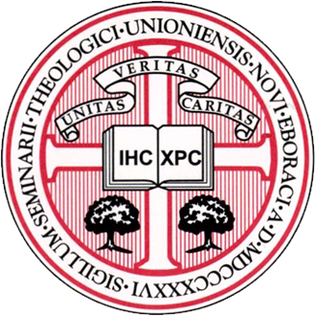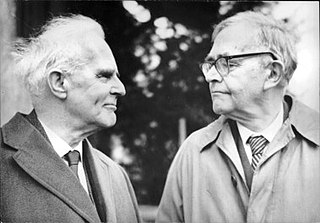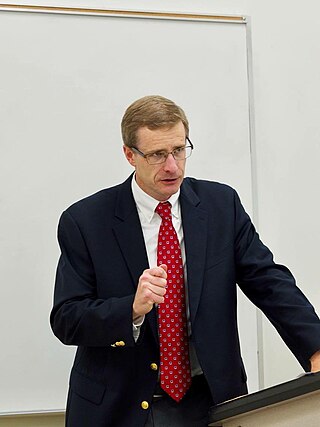Related Research Articles
Theology is the study of religious belief from a religious perspective. More narrowly it is the study of the nature of the divine. It is taught as an academic discipline, typically in universities and seminaries. It occupies itself with the unique content of analyzing the supernatural, but also deals with religious epistemology, asks and seeks to answer the question of revelation. Revelation pertains to the acceptance of God, gods, or deities, as not only transcendent or above the natural world, but also willing and able to interact with the natural world and to reveal themselves to humankind.
Christian fundamentalism, also known as fundamental Christianity or fundamentalist Christianity, is a religious movement emphasizing biblical literalism. In its modern form, it began in the late 19th and early 20th centuries among British and American Protestants as a reaction to theological liberalism and cultural modernism. Fundamentalists argued that 19th-century modernist theologians had misunderstood or rejected certain doctrines, especially biblical inerrancy, which they considered the fundamentals of the Christian faith.
The following outline is provided as an overview of and topical guide to Christian theology:

Paul Johannes Tillich was a German-American Christian existentialist philosopher, Christian socialist, and Lutheran theologian who was one of the most influential theologians of the twentieth century. Tillich taught at German universities before immigrating to the United States in 1933, where he taught at Union Theological Seminary, Harvard University, and the University of Chicago.
Systematic theology, or systematics, is a discipline of Christian theology that formulates an orderly, rational, and coherent account of the doctrines of the Christian faith. It addresses issues such as what the Bible teaches about certain topics or what is true about God and his universe. It also builds on biblical disciplines, church history, as well as biblical and historical theology. Systematic theology shares its systematic tasks with other disciplines such as constructive theology, dogmatics, ethics, apologetics, and philosophy of religion.

Union Theological Seminary in the City of New York is a private ecumenical liberal Christian seminary in Morningside Heights, Manhattan, affiliated with Columbia University. Columbia University lists UTS among its affiliate schools, alongside with Barnard College and Teachers College. Since 1928, the seminary has served as Columbia's constituent faculty of theology. In 1964, UTS also established an affiliation with the neighboring Jewish Theological Seminary of America. Despite its affiliation with Columbia University, UTS is an independent institution with its own administration and Board of Trustees. UTS confers the following degrees: Master of Divinity (MDiv), Master of Divinity & Social Work dual degree (MDSW), Master of Arts in religion (MAR), Master of Arts in Social Justice (MASJ), Master of Sacred Theology (STM), Doctor of Ministry (DMin), and Doctor of Philosophy (PhD).
In Christianity, Neo-orthodoxy or Neoorthodoxy, also known as theology of crisis and dialectical theology, was a theological movement developed in the aftermath of the First World War. The movement was largely a reaction against doctrines of 19th century liberal theology and a reevaluation of the teachings of the Reformation. Karl Barth is the leading figure associated with the movement. In the U.S., Reinhold Niebuhr was a leading exponent of neo-orthodoxy. It is unrelated to Eastern Orthodoxy.
Liberal Christianity, also known as liberal theology and historically as Christian Modernism, is a movement that interprets Christian teaching by taking into consideration modern knowledge, science and ethics. It emphasizes the importance of reason and experience over doctrinal authority. Liberal Christians view their theology as an alternative to both atheistic rationalism and theologies based on traditional interpretations of external authority, such as the Bible or sacred tradition.

Scott Walker Hahn is an American Catholic theologian and Christian apologist. A former Protestant, Hahn was a Presbyterian minister who converted to Catholicism. Hahn's popular works include Rome Sweet Home and The Lamb's Supper: The Mass as Heaven on Earth. His lectures have been featured in multiple audio distributions through Lighthouse Catholic Media. Hahn is known for his research on Early Christianity during the Apostolic Age and various theoretical works concerning the early Church Fathers.

Heinrich Emil Brunner (1889–1966) was a Swiss Reformed theologian. Along with Karl Barth, he is commonly associated with neo-orthodoxy or the dialectical theology movement.
Conservative Christianity, also known as conservative theology, theological conservatism, traditional Christianity, or biblical orthodoxy is a grouping of overlapping and denominationally diverse theological movements within Christianity that seeks to retain the orthodox and long-standing traditions and beliefs of Christianity. It is contrasted with Liberal Christianity and Progressive Christianity, which are seen as heretical heterodoxies by theological conservatives. Conservative Christianity should not be mistaken as being necessarily synonymous with the political philosophy of conservatism, nor the Christian right.
A Bible college, sometimes referred to as a Bible institute or theological institute or theological seminary, is an evangelical Christian or Restoration Movement Christian institution of higher education which prepares students for Christian ministry with theological education, Biblical studies and practical ministry training.
Allen James Reimer was a Canadian Mennonite theologian who held a dual academic appointment as Professor of Religious Studies and Christian Theology at Conrad Grebel University College, a member college of the University of Waterloo, and at the Toronto School of Theology, a consortium of divinity schools federated with the University of Toronto. At the University of Waterloo's fall 2008 convocation, he was named Distinguished Professor Emeritus, an honor seldom bestowed on retired faculty.
Theological aesthetics is the interdisciplinary study of theology and aesthetics, and has been defined as being "concerned with questions about God and issues in theology in the light of and perceived through sense knowledge, through beauty, and the arts". This field of study is broad and includes not only a theology of beauty, but also the dialogue between theology and the arts, such as dance, drama, film, literature, music, poetry, and the visual arts.

David M. VanDrunen is the Robert B. Strimple Professor of Systematic Theology and Christian Ethics at Westminster Seminary California. VanDrunen was the 2004 recipient of the Acton Institute's Novak Award, a visiting fellow at the Center for the Study of Law and Religion at Emory University in 2009, and a Henry Luce III Fellow in Theology for the 2016–2017 academic year.
Carl Edward Braaten was an American Lutheran theologian and minister.
Leonard Hodgson was an Anglican priest, philosopher, theologian, historian of the early Church and Regius Professor of Divinity at the University of Oxford from 1944 to 1958.
Georges Henri Tavard, AA was an ordained member of the Augustinians of the Assumption. He lectured extensively in the areas of historical theology, ecumenism, and spirituality.
Stanley Jedidiah Samartha was an Indian theologian and a participant in inter-religious dialogue.
The believers' Church is a theological doctrine of Evangelical Christianity which teaches that one becomes a member of the Church by new birth and profession of faith. Adherence to this doctrine is a common defining feature of an Evangelical Christian church.
References
- Lott, David B. (2013). "Introduction" (PDF). In Lott, David B. (ed.). Douglas John Hall: Collected Readings. Minneapolis, Minnesota: Fortress Press. ISBN 978-0-8006-9986-4 . Retrieved 14 June 2017.